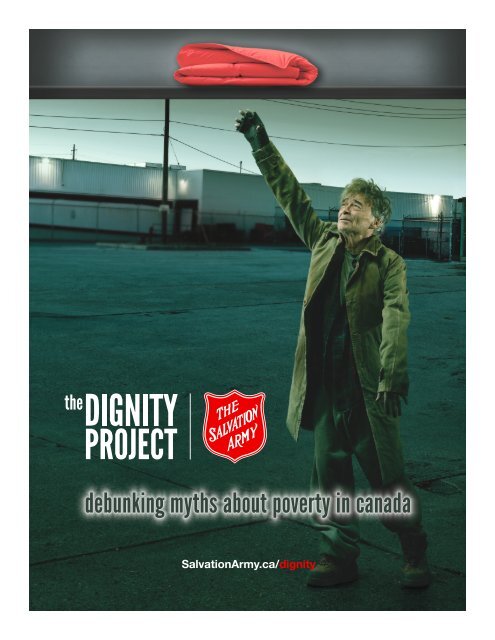debunking myths about poverty in canada
the Dignity Project - The Salvation Army in Canada
the Dignity Project - The Salvation Army in Canada
- No tags were found...
You also want an ePaper? Increase the reach of your titles
YUMPU automatically turns print PDFs into web optimized ePapers that Google loves.
<strong>debunk<strong>in</strong>g</strong> <strong>myths</strong> <strong>about</strong> <strong>poverty</strong> <strong>in</strong> <strong>canada</strong><br />
SalvationArmy.ca/dignity
overview<br />
You may not come across <strong>poverty</strong> on a daily basis <strong>in</strong> Canada, but believe us, it’s there. In fact, one <strong>in</strong><br />
11 Canadians, a number that has gone relatively unchanged over the past decade, live <strong>in</strong> <strong>poverty</strong> today.<br />
This year, to co<strong>in</strong>cide with the launch of our new <strong>in</strong>itiative, the Dignity Project, The Salvation Army is<br />
releas<strong>in</strong>g data to illustrate public perceptions of <strong>poverty</strong> and the poor.<br />
One of the primary motivations for launch<strong>in</strong>g the Dignity Project is to educate the public <strong>about</strong> the<br />
reality of <strong>poverty</strong> <strong>in</strong> the 21st century — and underscore the po<strong>in</strong>t that everyone deserves fundamental<br />
human dignity. In order to acheive this, we felt it was first important to take stock and answer this question:<br />
How do average Canadians feel <strong>about</strong> the poor liv<strong>in</strong>g among them today?<br />
Our goal <strong>in</strong> releas<strong>in</strong>g this data is to educate the public and address some of the misconceptions<br />
<strong>about</strong> Canadians liv<strong>in</strong>g <strong>in</strong> <strong>poverty</strong>. The report f<strong>in</strong>d<strong>in</strong>gs reflect some good news and some bad news. The<br />
vast majority of Canadians do believe that everyone, despite their socioeconomic status, deserves<br />
dignity and most agree that the poor deserve a help<strong>in</strong>g hand. The bad news is that many still believe that<br />
the poor have mostly themselves to blame and that <strong>poverty</strong> is a choice. This is contrary to The Salvation<br />
Army’s experience serv<strong>in</strong>g the poor <strong>in</strong> Canada for nearly 130 years.<br />
Accord<strong>in</strong>g to our survey, Canadians believe that <strong>poverty</strong> is the third most important issue fac<strong>in</strong>g<br />
the country today, beh<strong>in</strong>d the economy and health care.<br />
Other key f<strong>in</strong>d<strong>in</strong>gs of the report <strong>in</strong>clude:<br />
• About 50 percent of Canadians feel that a family of four could get by on $10,000 – $30,000 per<br />
year or less.<br />
• Nearly half of all Canadians feel that if poor people really want to work, they can always f<strong>in</strong>d<br />
a job.<br />
• Nearly 40 percent believe people who live <strong>in</strong> <strong>poverty</strong> <strong>in</strong> Canada “still have it pretty good.”<br />
• About a quarter of Canadians feel that people are poor because they are lazy and have lower<br />
moral values than average.<br />
• 96 percent of Canadians believe that everyone deserves a sense of dignity, but only 65<br />
percent believe that be<strong>in</strong>g poor can rob you of dignity.<br />
Today, approximately three million Canadians live <strong>in</strong> <strong>poverty</strong> and each year The Salvation Army<br />
serves 1.6 million people across the country with basic needs — many among the nation’s poor. The<br />
Salvation Army takes a holistic approach to service and makes every effort to restore a sense of dignity<br />
to our clients. With the launch of the Dignity Project, The Salvation Army is work<strong>in</strong>g to address the<br />
dehumaniz<strong>in</strong>g scourge of <strong>poverty</strong> and <strong>in</strong>justice and educate the public <strong>about</strong> what it means to live <strong>in</strong><br />
<strong>poverty</strong> — and what they can do to help. With your support, dignity is with<strong>in</strong> reach for all!
i<br />
Myth: Poverty is a choice and the poor are the problem.<br />
Fact: There are systemic barriers that make escap<strong>in</strong>g <strong>poverty</strong> difficult,<br />
if not impossible, for many.<br />
Canadians’ attitude towards the poor<br />
If poor people really want to work,<br />
they can always f<strong>in</strong>d a job<br />
A good work ethic is all you need<br />
to escape <strong>poverty</strong><br />
I th<strong>in</strong>k that if we gave poor people more assistance,<br />
they would just take advantage of it and do noth<strong>in</strong>g<br />
Poor people usually have<br />
lower moral values<br />
People are poor because<br />
they are lazy<br />
23%<br />
28%<br />
43%<br />
41%<br />
49%<br />
Our report revealed startl<strong>in</strong>g perceptions <strong>about</strong> the poor. Many Canadians hold op<strong>in</strong>ions that perpetuate<br />
the idea that “the poor are the problem” and that their decisions and choices led them to a life of<br />
<strong>poverty</strong>:<br />
• Nearly half of all respondents agreed with the notion that, if poor people really want to work,<br />
they can always f<strong>in</strong>d a job.<br />
• 43 percent agreed that “a good work ethic is all you need to escape <strong>poverty</strong>.”<br />
• 41 percent believe that the poor would “take advantage” of any assistance given and “do<br />
noth<strong>in</strong>g.”<br />
• 28 percent believe the poor have lower moral values than average.<br />
• And nearly a quarter believe that “people are poor because they are lazy.”<br />
Certa<strong>in</strong>ly, personal choice plays a role <strong>in</strong> all of our lives and some <strong>in</strong>dividuals make poor decisions<br />
that contribute to future problems. However, there are also significant systemic barriers that perpetuate<br />
a cycle of <strong>poverty</strong>. Many <strong>in</strong>dividuals that are liv<strong>in</strong>g <strong>in</strong> <strong>poverty</strong> experience difficulty reta<strong>in</strong><strong>in</strong>g stable<br />
employment, due to challenges such as mental health issues and addiction that <strong>in</strong>hibit their success,<br />
and with the Canadian unemployment rate currently at 7.8 percent, f<strong>in</strong>d<strong>in</strong>g a job is easier said than done.<br />
A 2009 study of men at Salvation Army shelters nationwide showed that 90 percent would prefer to<br />
live <strong>in</strong> permanent hous<strong>in</strong>g and 51 percent reported mak<strong>in</strong>g attempts to f<strong>in</strong>d permanent hous<strong>in</strong>g.<br />
More than one-quarter of these shelter users were actually employed <strong>in</strong> some capacity — and yet<br />
were still utiliz<strong>in</strong>g the shelter system. As Canada cont<strong>in</strong>ues to emerge from one of the most severe<br />
economic recessions <strong>in</strong> recent history, The Salvation Army is see<strong>in</strong>g many former donors com<strong>in</strong>g<br />
through our doors to keep their families cared for and fed. Everyday, we witness people mak<strong>in</strong>g strides<br />
to escape <strong>poverty</strong>.<br />
SalvationArmy.ca/dignity
ii<br />
Myth: A family of four is able to live off of $10,000 – $30,000 a year.<br />
Fact: It is extremely difficult to get by on this amount. For a family of<br />
four liv<strong>in</strong>g <strong>in</strong> an urban area, the actual <strong>poverty</strong> level cut-off is<br />
nearly $35,000.<br />
What is the least amount of money a family of four can get by on <strong>in</strong> Canada?<br />
45%<br />
5%<br />
16%<br />
33%<br />
< $10,000<br />
$10,000 – $20,000<br />
$20,000 – $30,000<br />
$30,000 +<br />
Many Canadians underestimate the level at which a family of four qualifies as impoverished with<br />
more than half of all respondents pegg<strong>in</strong>g the “get by” level between $10,000 and $30,000.<br />
Specifically:<br />
• A third of respondents felt that a family of four could subsist at $20,000 – $30,000 per year.<br />
• 16 percent believed $10,000 – $20,000 was reasonable.<br />
• Five percent suggested the family could live on less than $10,000.<br />
• On a positive note, 85 percent of respondents recognized that it is almost impossible to<br />
survive on m<strong>in</strong>imum wage.<br />
In fact, it is extremely difficult for a family of four to live on less than $40,000 per year <strong>in</strong> an urban area.<br />
Accord<strong>in</strong>g to Statistics Canada, the average family of four, with two work<strong>in</strong>g parents, has an annual<br />
<strong>in</strong>come of $84,800. To qualify as impoverished, a family’s total <strong>in</strong>come needs to amount to $34,289, less<br />
than half of this average. In a rural area, the <strong>poverty</strong> level is $22,783. Often, The Salvation Army serves<br />
clients whose annual <strong>in</strong>come is actually slightly higher than these cut-off rates, demonstrat<strong>in</strong>g that even<br />
these <strong>poverty</strong> levels may be slightly unrealistic.
iii<br />
Myth: People <strong>in</strong> Canada who are liv<strong>in</strong>g <strong>in</strong> <strong>poverty</strong> still have it pretty good.<br />
Fact: A life <strong>in</strong> <strong>poverty</strong> is extremely difficult and can rob you of basic<br />
dignity.<br />
Canadians’ perceptions on the poor.<br />
People <strong>in</strong> Canada who are liv<strong>in</strong>g <strong>in</strong><br />
“<strong>poverty</strong>” still have it pretty good<br />
37%<br />
There is really noth<strong>in</strong>g much I can<br />
do to help poor people<br />
37%<br />
I don’t really see many people <strong>in</strong><br />
Canada who are truly poor<br />
24%<br />
Poverty is a problem that we<br />
can’t really do much <strong>about</strong><br />
18%<br />
Many Canadians cont<strong>in</strong>ue to believe the myth that Canadians liv<strong>in</strong>g <strong>in</strong> <strong>poverty</strong> still have it “okay” and<br />
that, even if it was a problem, there’s not much they can do to help. A significant m<strong>in</strong>ority agree that:<br />
• People liv<strong>in</strong>g <strong>in</strong> <strong>poverty</strong> <strong>in</strong> Canada “still have it pretty good.” (37 percent)<br />
• There is really noth<strong>in</strong>g much I can do to help poor people. (37 percent)<br />
• Poverty is a problem that we can’t really do much <strong>about</strong>. (18 percent)<br />
A life <strong>in</strong> <strong>poverty</strong> is far from good. Accord<strong>in</strong>g to a 2009 study of Salvation Army shelter residents,<br />
nearly half <strong>in</strong>dicated that they were experienc<strong>in</strong>g an ongo<strong>in</strong>g health problem brought on by challeng<strong>in</strong>g<br />
liv<strong>in</strong>g conditions. While many poor receive government assistance, research has demonstrated that this<br />
typically does not cover the cost of affordable hous<strong>in</strong>g.<br />
The good news is that, despite perceptions to the contrary, there is someth<strong>in</strong>g you can do to help by<br />
donat<strong>in</strong>g to, or volunteer<strong>in</strong>g with, a variety of human service organizations across the country.<br />
SalvationArmy.ca/dignity
iv<br />
Myth: Canadians are apathetic <strong>about</strong> the topic of <strong>poverty</strong>.<br />
Fact: Canadians ranked <strong>poverty</strong> as the third most important issue<br />
fac<strong>in</strong>g the country today.<br />
Perceptions on <strong>poverty</strong><br />
People <strong>in</strong> <strong>poverty</strong> deserve<br />
a help<strong>in</strong>g hand<br />
Help<strong>in</strong>g out poor families helps set up<br />
children of these families for success<br />
Once you become poor it is really hard<br />
to f<strong>in</strong>d a way out of <strong>poverty</strong><br />
I th<strong>in</strong>k that if we gave poor people more assistance,<br />
they could escape <strong>poverty</strong><br />
Poverty is a trap some Canadians just can’t escape,<br />
no matter how hard they try<br />
63%<br />
70%<br />
68%<br />
81%<br />
89%<br />
29%<br />
The most important<br />
issues fac<strong>in</strong>g<br />
Canada today<br />
20%<br />
9%<br />
8%<br />
8%<br />
7%<br />
4%<br />
4%<br />
2%<br />
1%<br />
0%<br />
0%<br />
0%<br />
Economy<br />
Health Care<br />
Poverty<br />
Tax Relief<br />
Enviroment<br />
Unemployment<br />
Crime<br />
Education<br />
Energy / Electricity<br />
Terrorism<br />
Afghanistan<br />
National Unity<br />
Ethics / Accountability<br />
Now for the good news. Many Canadians recognize that <strong>poverty</strong> is a critical issue. In fact, <strong>poverty</strong><br />
was ranked as the third most critical issue fac<strong>in</strong>g the country <strong>in</strong> our survey, with n<strong>in</strong>e percent of<br />
responses. Coupled with related topics like unemployment (seven percent) and the economy (29<br />
percent), Canadians clearly recognize the importance of an economically well-off populace. Most<br />
Canadians also agree that people deserve help to escape <strong>poverty</strong>:<br />
• 89 percent of respondents agreed that people liv<strong>in</strong>g <strong>in</strong> <strong>poverty</strong> deserve a help<strong>in</strong>g hand.<br />
• 81 percent agreed that help<strong>in</strong>g out poor families helps set up children of these families for<br />
success.<br />
• 63 percent agreed that <strong>poverty</strong> is a trap that is hard to escape.<br />
Canadians are far from apathetic <strong>about</strong> issues of <strong>poverty</strong>. While some may have misconceptions<br />
<strong>about</strong> what it means to be poor, there is a general understand<strong>in</strong>g that <strong>poverty</strong> is an important problem<br />
that deserves the attention of society and <strong>in</strong>dividuals.
conclusion<br />
Fact: Human dignity is a fundamental right for all.<br />
Believe that everyone deserves<br />
a sense of dignity<br />
96%<br />
Believe that provid<strong>in</strong>g a sense of human dignity<br />
is a critical part of any social service program<br />
92%<br />
Believe that be<strong>in</strong>g poor<br />
robs you of dignity<br />
65%<br />
Believe that poor people have hard lives because government<br />
benefits don’t go far enough to help them live with dignity<br />
53%<br />
As the largest non-governmental direct provider of social services <strong>in</strong> Canada, The Salvation Army<br />
believes that everyone deserves dignity. Our survey respondents tend to agree:<br />
• 96 percent of respondents believe that everyone deserves a sense of dignity.<br />
• 92 percent believe that provid<strong>in</strong>g a sense of human dignity is a critical part of any social<br />
service program.<br />
• 65 percent believe be<strong>in</strong>g poor robs you of dignity, mean<strong>in</strong>g more than one-third disagree with<br />
this fundamental fact.<br />
For too many Canadians, the basic necessities of life required for human dignity are out of reach.<br />
Poverty is often the root cause, leav<strong>in</strong>g three million Canadians without access to everyday resources<br />
such as food, cloth<strong>in</strong>g and shelter.<br />
For The Salvation Army it is important to understand the public’s perceptions on <strong>poverty</strong>. Break<strong>in</strong>g<br />
through misconceptions and mov<strong>in</strong>g towards facts are critical ways we can help break the cycle of<br />
<strong>poverty</strong>. This report demonstrates the road ahead to get the Canadian public to overcome false<br />
impressions of the poor and educate them on the reality of a life <strong>in</strong> <strong>poverty</strong>.<br />
We have developed the Dignity Project to <strong>in</strong>spire and educate the public <strong>about</strong> the challenges<br />
fac<strong>in</strong>g society’s most vulnerable people. We believe that together, we can address the dehumaniz<strong>in</strong>g<br />
nature of <strong>poverty</strong> and <strong>in</strong>justice. We are ask<strong>in</strong>g all Canadians to jo<strong>in</strong> the Dignity Project — let’s restore<br />
dignity and hope for all!<br />
SalvationArmy.ca/dignity
survey methodology<br />
This study was conducted onl<strong>in</strong>e by Angus Reid Public Op<strong>in</strong>ion with a<br />
sample of 1,025 Canadians drawn from the Angus Reid Forum, a panel of<br />
100,000+ Canadians who have agreed to participate <strong>in</strong> research. The survey<br />
was conducted January 26-27, 2011 <strong>in</strong> both English and French. The data<br />
was weighed by age, gender, region, language and past Federal vote, to<br />
ensure a representative sample of Canadian public op<strong>in</strong>ion.<br />
With a sample of this size, the data can be considered accurate approximately<br />
+/- 3.1%, 19 times out of 20.<br />
SalvationArmy.ca/dignity<br />
The Salvation Army is an <strong>in</strong>ternational Christian organization that<br />
began its work <strong>in</strong> Canada <strong>in</strong> 1882 and has grown to become the largest nongovernmental<br />
direct provider of social services <strong>in</strong> the country. The Salvation<br />
Army gives hope and support to vulnerable people today and everyday <strong>in</strong> 400<br />
communities across Canada and more than 120 countries around the world.<br />
The Salvation Army offers practical assistance for children and families,<br />
often tend<strong>in</strong>g to the basic necessities of life, provid<strong>in</strong>g shelter for homeless<br />
people and rehabilitation for people who have lost control of their lives to an<br />
addiction. When you give to The Salvation Army, you are <strong>in</strong>vest<strong>in</strong>g <strong>in</strong> the future of<br />
marg<strong>in</strong>alized and overlooked people <strong>in</strong> your community.<br />
© 2011 The Salvation Army – Canada and Bermuda Territory<br />
Produced by the Public Relations and Development Department, Territorial Headquarters, 2 Overlea Boulevard, Toronto, Ontario M4H 1P4<br />
Cover image: Grey Canada











